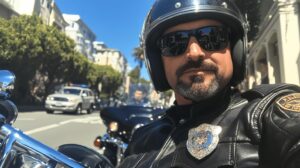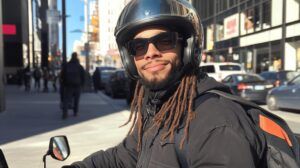Motorcyclists are amongst the most vulnerable drivers on the road because they travel at high speeds and are almost completely exposed. When they get into an accident, the injuries are often severe or even fatal. That’s why riders of all levels of experience understand the significance of staying safe on the road.
The most effective way of preventing head injuries and fatalities caused by a motorcycle crash is to wear a correctly fitted DOT-approved helmet.
It has been proven that not wearing a helmet, or wearing a substandard helmet increases the risk of fatalities and injuries in motorcycle accidents.
The Department of Transportation (DOT) provides a clear guideline of what sort of helmet a rider should wear on or off the road when riding a motorcycle.
Anyone who drives or rides a motorcycle must have to wear a safety helmet that fulfills the U.S. Department of Transportation’s Federal Motor Vehicle Safety Standards (FMVSS).
However, the main concern is that not all helmets sold online or in stores are DOT-approved and hence are not always legal to use on the road.
So, the question that motorcyclists ask often is “which helmet should I buy that is legal to wear on the road?”
To answer this intriguing question, we researched some of the best DOT-approved motorcycle helmets, which are not only legal to wear on the road but are also among the safest motorcycle helmets available. Let’s discover which one is the best fit for you.
Types of Motorcycle Helmets That Are Legal
Motorcycle helmets come in different styles, each with its own set of advantages and disadvantages. The helmet you have to choose will most likely be based on your personal preferences.
Full-Face Helmets

The full-face helmet gives the most head and neck protection and is considered to be the safest form of a motorcycle helmet. Many helmet manufacturers follow DOT safety regulations while manufacturing full-face helmets; however, DOT standards are low in comparison to other safety standards.
The most stringent standards are set by the Snell Memorial Foundation, an independent non-profit helmet testing company that has been in operation for more than 50 years. Snell standards meet or exceed DOT regulations and ensure the best protection. But unfortunately, helmets that pass the Snell test are few only.
Shoei, a well-known Japanese brand with 60 years of helmet building experience, is one of the brands that developed helmets as per the DOT, SNELL, and other safety standards such as ECE. Since 1959, the company has shown many remarkable innovations in the helmet building industry. Their Shoei 1400 helmet is both DOT and Snell-certified and has several notable characteristics that set it apart from other full-face helmets.
Shoei’s RF helmet line is also quite popular among riders, with Shoei rf sr and Shoei rf 1200 helmets having both DOT and SNELL certifications. Another popular model of Shoei is the Shoei gt air helmet, which contains all of the outstanding qualities a helmet should have.
Bell Qualifier is another renowned full-face helmet from a reputable brand that meets and exceeds the DOT’s FMVSS 218 standards. However, if you want a helmet for off-road riding, the Bell Vortex is the ideal option, as it proudly satisfies both Snell and DOT safety criteria.
One of the most affordable full-face polycarbonate shell helmets that also carries a Snell 2015 safety certification is HJC cl-17 helmet. It’s not only legal to wear on the road, but also provides higher quality materials at a much lower price.
Open Face (3/4) Helmets

Open face helmets cover the top, back, and sides of your head but leave the face exposed, which significantly reduces the safety of a rider. Furthermore, the helmet’s open design does not provide any protection from sunlight and road debris. But brands such as Daytona and Scorpion Exo manufactured open-face helmets with partial or full-face visors to protect your eyes and face from the sun and other elements. These helmets are DOT-certified and road-legal, as they are composed of durable materials to protect the rider from a head injury.
Modular Helmets

Modular helmets, also known as flip-up helmets, combine the benefits of both an open-face and a full-face helmet design. Bell broozer is a modular helmet that meets and exceeds DOT-safety standards and is dual-certified for both full-face and open-face riding. Another modular helmet ideal for travel and sports riding is the Schuberth c4 helmet. It is Schuberth’s top-of-the-line helmet that meets both DOT and ECE safety criteria.
Conclusion
Regardless of where you purchase your motorcycle helmet, make sure it is the right size, fits properly, and has a DOT sticker or labels of non-profit safety organizations like Snell.
These labels are good indicators that the helmet you’re considering is well-made and fulfills all the safety requirements.

Ryan Thompson is a 35-year-old sport bike enthusiast known for his adventurous spirit. With years of weekend rides and exploring new roads, Ryan brings fresh insights and firsthand experience to ProtectiveGearz. His energetic approach and passion for the latest gear make him a trusted source for riders seeking up-to-date advice.



